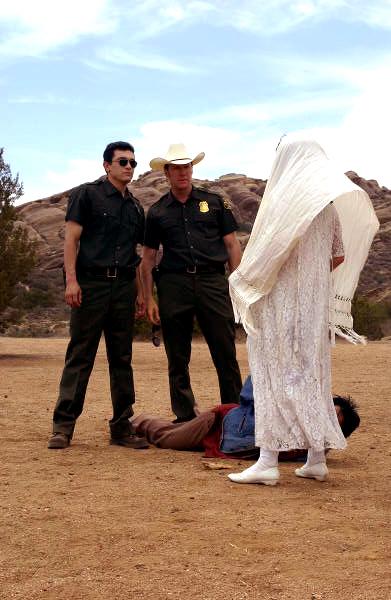La Llorona
This article needs additional citations for verification. (November 2010) |

La Llorona ("The Weeping Woman") is a widespread legend in North and South America.
Legend
Although several variations exist, the basic story tells of a beautiful woman by the name of malichina who drowns her children in order to be with the man that she loved. The man would not have her, which devastated her. She would not take no for an answer, so she drowned herself in a lake in Mexico city. Challenged at the gates of heaven as to the whereabouts of her children, she is not permitted to enter the afterlife until she has found them. Maria is forced to wander the Earth for all eternity, searching in vain for her drowned offspring, with her constant weeping giving her the name "La Llorona". She is trapped in between the living world and the spirit world.
In some versions of this tale and legend, La Llorona will kidnap wandering children who resemble her missing children, or children who disobey their parents. People who claim to have seen her say she appears at night or in the late evenings from rivers or oceans in Mexico. Some believe that those who hear the wails of La Llorona are marked for death, similar to the Gaelic banshee legend. She is said to cry, "Ay mis hijos!" which translates to, "Oh, my children!"
Function of the story
Typically, the legend serves as a cautionary tale on several levels. Parents will warn their children that bad behavior will cause La Llorona to abduct them,[1] and that being outside after dark will result in her visitation. The tale also warns young women not to be enticed by status, wealth, material goods, or by men who make declarations of love or lavish promises.
Other folktales
La Llorona bears a resemblance to the ancient Greek tale of the demonic demigodess Lamia.[2] Hera, Zeus' wife, learned of his affair with Lamia, and then forced Zeus to give up the relationship and punished Lamia by forcing her to eat her own children. Out of jealousy over the loss of her own children, Lamia preys upon human children and devours them if she catches them.[3][4] In Greek mythology, Medea killed the two children fathered by Jason (one of the Argonauts) after he left her for another woman.
Local Aztec folklore possibly influenced the legend; the goddess Cihuacoatl or Coatlicue was said to have appeared shortly prior to the discovery of New Spain by Hernán Cortés, weeping for her lost children, an omen of the fall of the Aztec empire.
La Llorona is also sometimes identified with La Malinche, the Nahua woman who served as Cortés' interpreter and who some say were betrayed by the Spanish conquistadors. In one folk story of La Malinche, she becomes Cortés' mistress and bore him a child, only to be abandoned so that he could marry a Spanish lady (although no evidence exists that La Malinche killed her children). Aztec pride drove La Malinche to acts of vengeance. In this context, the tale compares the Spanish discovery of New Spain and the demise of indigenous culture after the conquest with La Llorona's loss.
Popular culture
La Llorona was referenced in the Multiplayer online battle arena game League of Legends to commemorate the launch of the game in Latin America. Developer Riot Games released a skin for the character Morgana known as "Ghost Bride Morgana," alluding to the legend.[5]
See also
- Bloody Mary (folklore)
- White Lady (ghost)
- Banshee
- Baobhan sith
- Leannán sídhe
- Huldra
- sayona
- soucouyant
- samodiva
- cliodhna
- aswang
- pontianak
- Manananggal
- rusalka
- Succubus
References
- ^ de Jesús Hernández-Gutiérrez, Manuel (1997). Literatura Chicana, 1965-1995: An Anthology in Spanish, English, and Caló. Taylor and Francis. p. 93. ISBN 0-8153-2077-9.
{{cite book}}:|access-date=requires|url=(help); Unknown parameter|coauthors=ignored (|author=suggested) (help) - ^ "Folklore: In All of Us, In All We Do". University of North Texas Press.
- ^ Theoi Project: "Lamia"
- ^ Aristophanes, Peace
- ^ La Llorona in League of Legends
Bibliography
- Perez, Domino Renee, There Was a Woman: La Llorona from Folklore to Popular Culture
- Mathews, Holly F. 1992. The directive force of morality tales in a Mexican community. In Human motives and cultural models, edited by R.G.D'Andrade and C. Strauss, 127-62. New York: Cambridge University Press.
- Ray John De Aragon, The Legend of La Llorona, Sunstone Press, 2006. ISBN=1466429798 (ISBN13: 9781466429796).
- Belinda Vasquez Garcia, The Witch Narratives Reincarnation, Magic Prose Publishing, 2012. ISBN=978-0-86534-505-8 (ISBN13: 9781466429796).
External links
- The New Mexican La Llorona
- Handbook of Texas Online A summary of the tale.
- Supernatural TV Series - Season 1 - Pilot Episode Woman in White Episode
- Grimm TV Series - Season 2 - Episode 9 - La Llorona Episode
